Abiru to take a bath, shower Japanese people who have spent a number of years in English-speaking countries such as the United States often end up having their spoken Japanese affected by English. One example of this that I once heard was * M shaw o torimashita ka * , a direct translation of Have you taken a shower yet? In authentic Japanese, the sentence should be Shaw o abimashita ka , using the verb abiru rather than toru . Take a bath also can be furo o abiru , although another expression, furo ni hairu , is probably more common. EXAMPLE : Nihonjin wa furo o abiru ( or furo ni hairu) no ga hont ni suki da. )
The Japanese really love taking baths. Abunai dangerous Abunai most often means dangerous, risky, hazardous.
EXAMPLES : (1) Yopparai-unten wa abunai.
Drunk driving is dangerous. (2) Kodomo no matchi-asobi wa abunai.
Childrens playing with matches is hazardous. Abunai! ! may be used as an exclamation in situations where Look out! or Watch out! would be called for in English. For example, if you see someone walking into the path of an oncoming car, you shout out, Abunai! Other examples of adjectives used to give warning are Urusai! ! and Yakamashii! ! (lit., [You are] noisy!), both meaning Be quiet! or Shut up! (see URUSAI). A  chi
chi  kochi here and there Achikochi , short for achirakochira , looks very much like English here and there, except that the order is reversed, i.e., achikochi literally would be there and here. Although achikochi and here and there are quite similar in meaning, there is a slight difference.
kochi here and there Achikochi , short for achirakochira , looks very much like English here and there, except that the order is reversed, i.e., achikochi literally would be there and here. Although achikochi and here and there are quite similar in meaning, there is a slight difference.
Achikochi seems to cover a wider area than here and there, as in the following example. EXAMPLE : Achikochi sagashita keredo mitsukaranakatta.
I looked far and wide but couldnt find it. There is another variant, atchikotchi , which is a little more colloquial than achikochi . Agaru to go up The basic meaning of agaru is to go up. EXAMPLE : (1) Mata gasorin no nedan ga agatta.
The price of gasoline has gone up again. Entering a Japanese-style house as a guest is also agaru because it is an act of going up.
When you enter a Japanese home, you first step into the genkan , or vestibule. There you take off your shoes and take a step up to the floor level of the house. The act of stepping into the vestibule is hairu to go in, but the act of stepping up to the floor level of the house is agaru to take a step up. That is why the Japanese host says to a visitor: EXAMPLE : (2) Dzo oagari kudasai.
Please come in (lit., step up). Sentence (3) below therefore sounds extremely strange. EXAMPLE : (3) * Nihonjin wa ie ni hairu mae ni kutsu o nugimasu.
*
The Japanese take off their shoes before going into the house.
Agaru has to be used in this context. Otherwise sentence (3) would describe someone taking off his shoes outside the front door! A  isu
isu  ru to love The noun ai love and its verbal counterpart, aiuru to love, are both written expressions. Although some young lovers nowadays may use such words of endearment as Aishite-iru yo (mens speech) and Aishite-iru wa (womens speech) to mean I love you, such sentences still sound stilted because the verb aisuru is rarely used in speech. Kimi ga suki da (mens speech) and Anata ga suki yo (womens speech) also mean I love you. The versions containing suki (see SUKI) are more conversational and are perhaps more frequently used in speech than the versions with aisuru . 156) wisely points out, however, the most typically Japanese expression of love has been silence (although, in the rapidly changing society of contemporary Japan, this tradition too may be on its way out). 156) wisely points out, however, the most typically Japanese expression of love has been silence (although, in the rapidly changing society of contemporary Japan, this tradition too may be on its way out).
ru to love The noun ai love and its verbal counterpart, aiuru to love, are both written expressions. Although some young lovers nowadays may use such words of endearment as Aishite-iru yo (mens speech) and Aishite-iru wa (womens speech) to mean I love you, such sentences still sound stilted because the verb aisuru is rarely used in speech. Kimi ga suki da (mens speech) and Anata ga suki yo (womens speech) also mean I love you. The versions containing suki (see SUKI) are more conversational and are perhaps more frequently used in speech than the versions with aisuru . 156) wisely points out, however, the most typically Japanese expression of love has been silence (although, in the rapidly changing society of contemporary Japan, this tradition too may be on its way out). 156) wisely points out, however, the most typically Japanese expression of love has been silence (although, in the rapidly changing society of contemporary Japan, this tradition too may be on its way out).
A  ite
ite  partner, opponent Aite means someone with whom one does something. Depending on the activity, therefore, aite could be either ones partner or competitor. EXAMPLES : (1) kekkon no aite
partner, opponent Aite means someone with whom one does something. Depending on the activity, therefore, aite could be either ones partner or competitor. EXAMPLES : (1) kekkon no aite
marriage partner (2) ashita no shiai no aite
the opponent of tomorrows game/match A  kachan baby Akachan is normally a word for someone elses baby. EXAMPLE : (1) Otaku no akachan wa hont ni ogenki s desu n.
kachan baby Akachan is normally a word for someone elses baby. EXAMPLE : (1) Otaku no akachan wa hont ni ogenki s desu n.
Your baby really looks healthy, doesnt he/she! Although some Japanese, especially women, use the word to refer to their own babies, the practice, in my opinion, is in poor taste. The word to be used in that case is akanb .
Today is my babys birthday.
Today is my babys birthday.
A  kema
kema  shite o
shite o  medet gozaima
medet gozaima  su Happy New Year! When a New Year draws near, English speakers still new in Japan often ask their Japanese friends how to say Happy New Year! in Japanese. The answer is almost always Akemashite omedet gozaimasu (or its equivalent Shin-nen omedet gozaimasu ). Having received this answer, these English speakers practice hard to memorize this long salutation and, after finally learning it, they try it on their Japanese associatesmost likely toward the end of December. Unfortunately, this Japanese greeting may not be used until New Years Day since it literally means [The New Year] having begun, this is indeed a happy occasion. This contrasts with the English salutation Happy New Year!, which is an abbreviation of I wish you a happy New Year and may therefore be used before the arrival of the New Year. The expression to be used before the old year expires is Yoi otoshi o omukae kudasai May you see in a good year! However, this is a rather formal salutation and is rarely used among close friends.
su Happy New Year! When a New Year draws near, English speakers still new in Japan often ask their Japanese friends how to say Happy New Year! in Japanese. The answer is almost always Akemashite omedet gozaimasu (or its equivalent Shin-nen omedet gozaimasu ). Having received this answer, these English speakers practice hard to memorize this long salutation and, after finally learning it, they try it on their Japanese associatesmost likely toward the end of December. Unfortunately, this Japanese greeting may not be used until New Years Day since it literally means [The New Year] having begun, this is indeed a happy occasion. This contrasts with the English salutation Happy New Year!, which is an abbreviation of I wish you a happy New Year and may therefore be used before the arrival of the New Year. The expression to be used before the old year expires is Yoi otoshi o omukae kudasai May you see in a good year! However, this is a rather formal salutation and is rarely used among close friends.
There is regrettably no informal equivalent, except for the shorter form Yoi otoshi o , which is sometimes used. In America, New Years wishes are exchanged with vigor at the stroke of midnight among those present at New Years Eve parties. After that, however, Happy New Year! is, as it were, put away in mothballs fairly quickly in my experience. In Japan, Akemashite omedet gozaimasu is heard at least through the first week of January and sometimes as late as the middle of the month. Amai sweet Amai primarily means sweet in taste. )
( , )
sweet cake (chocolate, candy, etc.) Used figuratively, amai can mean indulgent, lenient or overly optimistic. )
( , )
sweet cake (chocolate, candy, etc.) Used figuratively, amai can mean indulgent, lenient or overly optimistic.
EXAMPLES : (2) amai oya
indulgent parents (3) amai ten
lenient grades ( or marks) (4) amai kangae
an overly optimistic view Unlike English sweet, amai cannot mean amiable or kind. In English, calling someone a sweet person would be complimentary. In Japanese, on the other hand, amai hito , if it means anything at all, can only be interpreted as either an indulgent person or an overly optimistic person. Amari too, excessively Amari means too in the sense of excessively. The word mainly appears in negative sentences. (2) Koko wa amari shizuka ja nai.
It is not too quiet here . (3) Watashi wa amari nomimasen.
I dont drink too much . (3) Watashi wa amari nomimasen.
I dont drink too much .
Amari may be used in the affirmative if it appears in a dependent clause. EXAMPLES : (4) Amari nomu to byki ni narimasu yo.
Next page
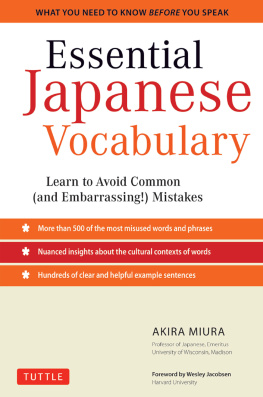
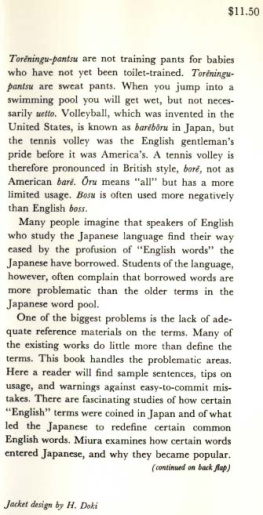
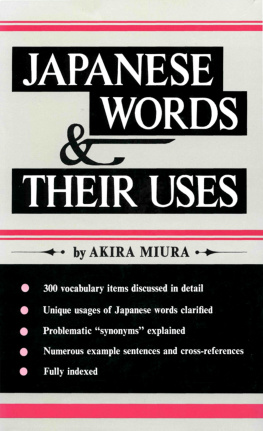
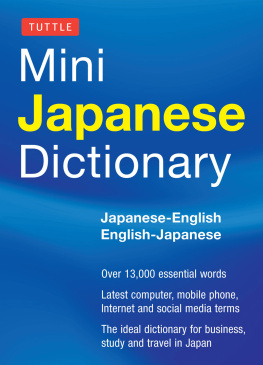
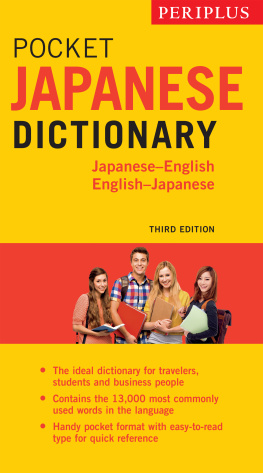


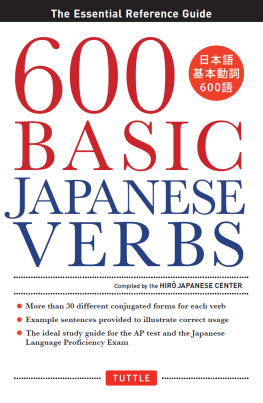
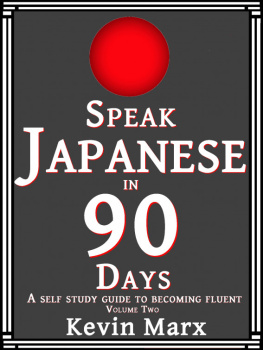
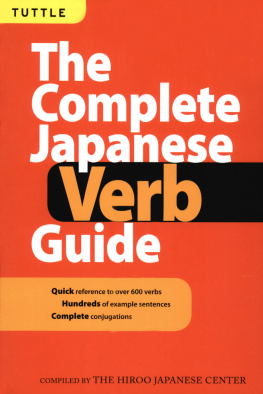

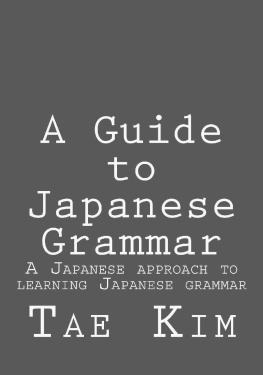
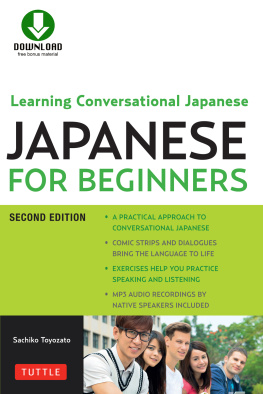
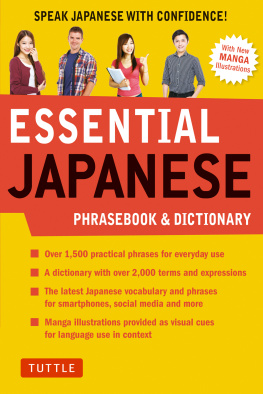
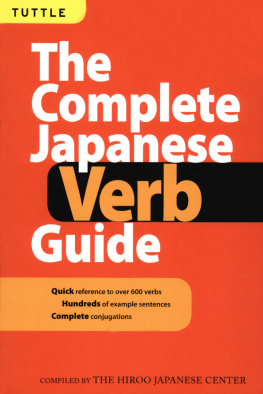
 chi
chi  kochi here and there Achikochi , short for achirakochira , looks very much like English here and there, except that the order is reversed, i.e., achikochi literally would be there and here. Although achikochi and here and there are quite similar in meaning, there is a slight difference.
kochi here and there Achikochi , short for achirakochira , looks very much like English here and there, except that the order is reversed, i.e., achikochi literally would be there and here. Although achikochi and here and there are quite similar in meaning, there is a slight difference.